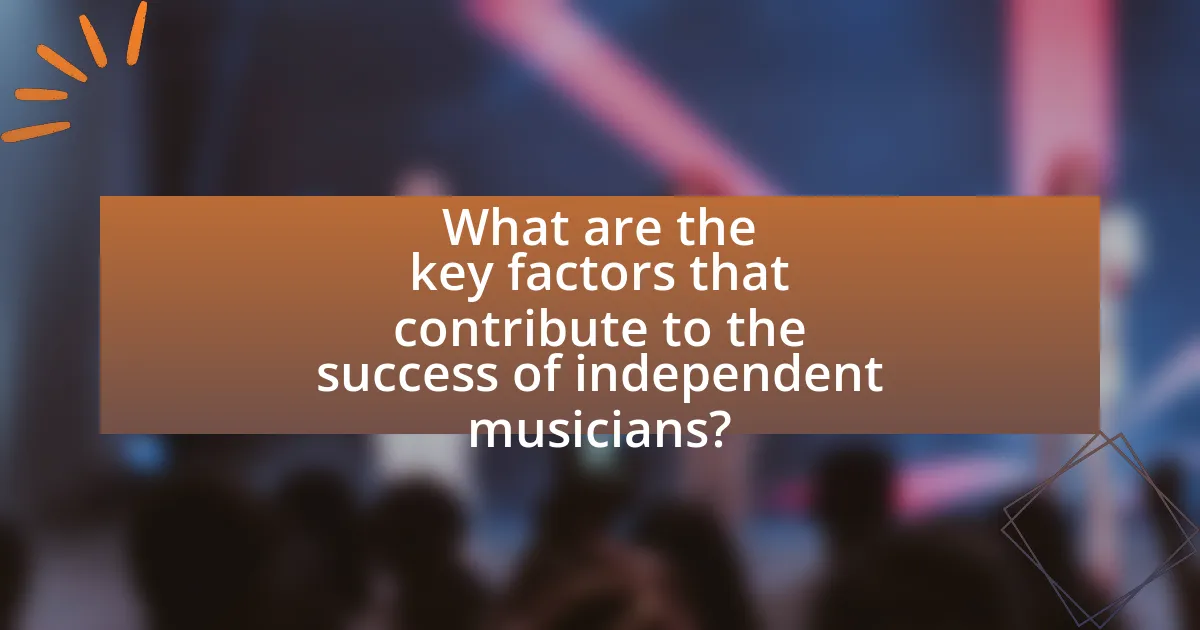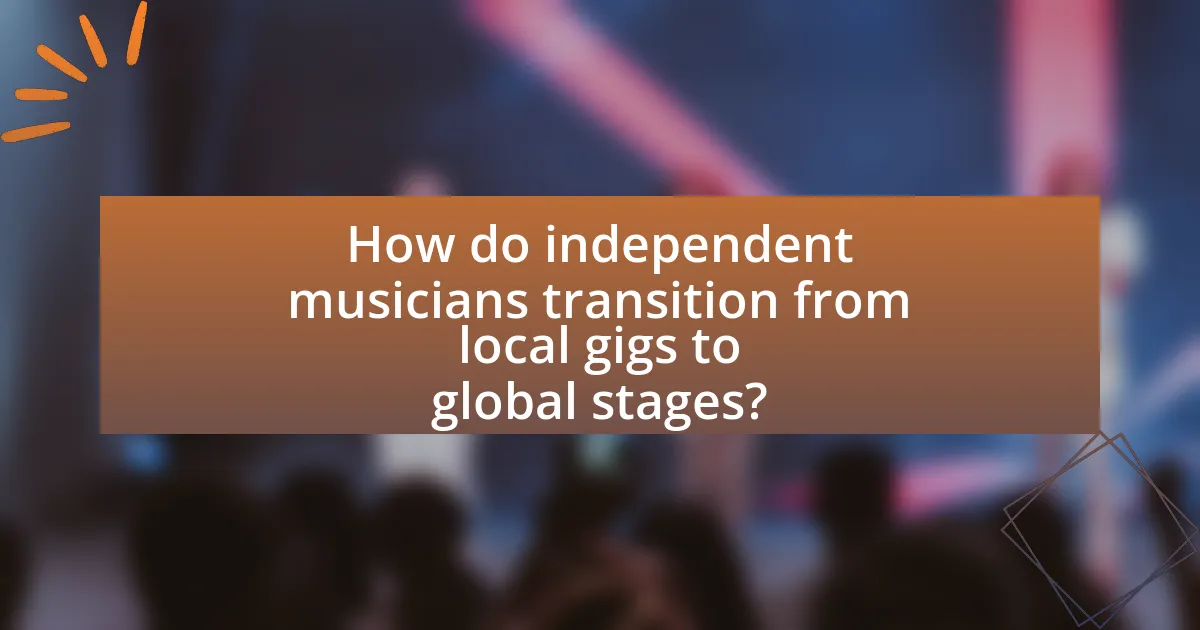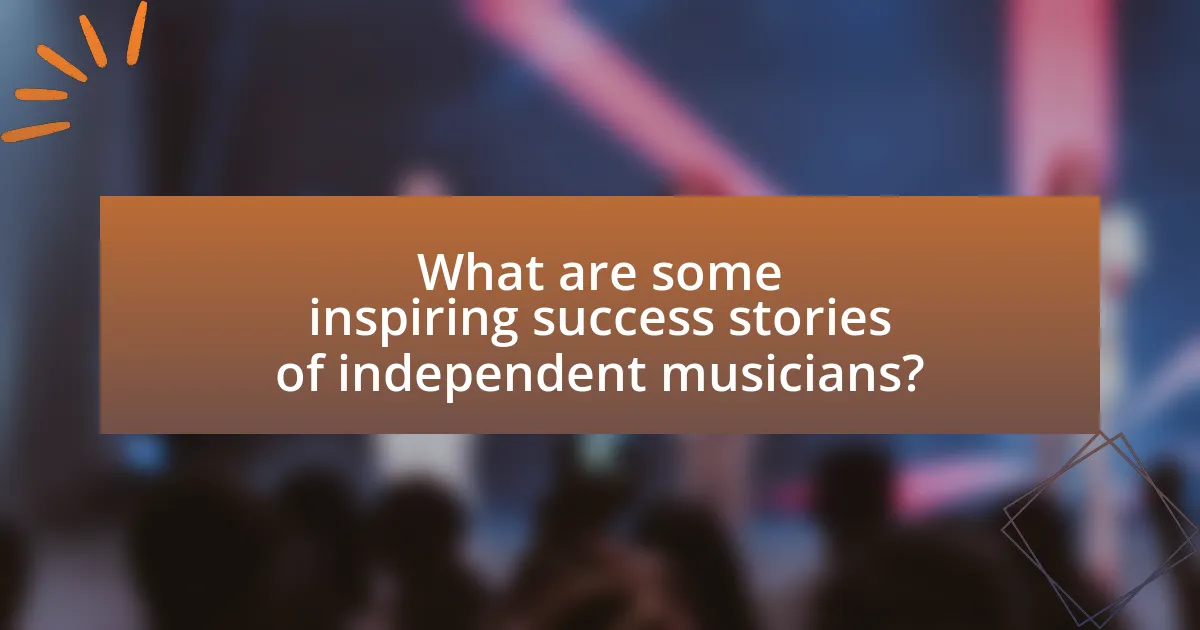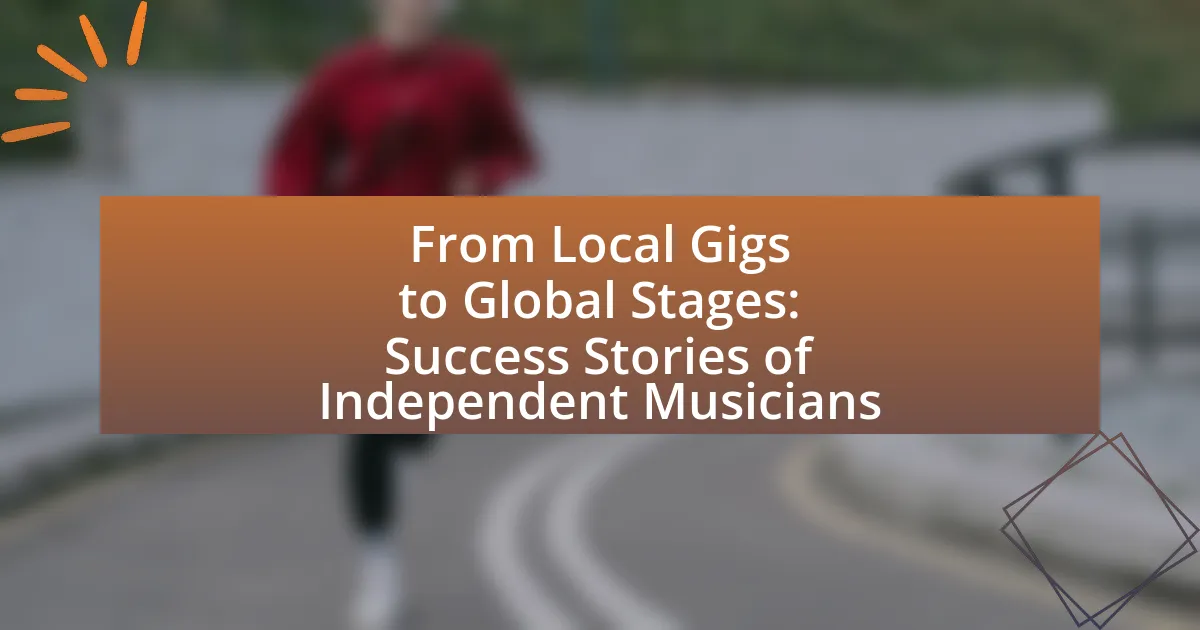The article “From Local Gigs to Global Stages: Success Stories of Independent Musicians” examines the essential factors contributing to the success of independent musicians, including effective marketing strategies, social media presence, and high-quality music production. It highlights the significance of local gigs in building a music career, emphasizing the skills musicians develop through live performances and the influence of local audiences on their growth. Additionally, the article explores the role of social media in promoting independent artists, the importance of networking, and strategies for transitioning from local to global recognition. Inspiring success stories of artists like Chance the Rapper and Billie Eilish illustrate how independent musicians can achieve fame while maintaining authenticity and artistic integrity.

What are the key factors that contribute to the success of independent musicians?
The key factors that contribute to the success of independent musicians include effective marketing strategies, strong social media presence, and high-quality music production. Effective marketing strategies allow musicians to reach wider audiences, as evidenced by the rise of platforms like Bandcamp and SoundCloud, which enable artists to promote their work directly to fans. A strong social media presence is crucial; according to a 2021 study by the International Journal of Music Business Research, 70% of independent musicians reported that social media significantly increased their fan engagement and visibility. High-quality music production enhances the overall appeal of their work, with studies showing that professionally produced tracks receive more streams and downloads compared to amateur recordings. These factors collectively create a robust foundation for independent musicians to thrive in a competitive industry.
How do local gigs serve as a foundation for building a music career?
Local gigs serve as a foundation for building a music career by providing artists with essential performance experience, audience engagement, and networking opportunities. Performing at local venues allows musicians to hone their craft, develop stage presence, and receive immediate feedback from live audiences, which is crucial for artistic growth. Additionally, these gigs help artists build a local fan base, which can lead to increased visibility and support within the community. Networking with other musicians, venue owners, and industry professionals during these events can open doors to future opportunities, such as collaborations or larger performances. Statistics show that many successful musicians, including Taylor Swift and Ed Sheeran, began their careers by performing at local venues, illustrating the importance of local gigs in establishing a sustainable music career.
What skills do musicians develop through performing at local venues?
Musicians develop a variety of skills through performing at local venues, including stage presence, audience engagement, and adaptability. Stage presence enhances their ability to captivate an audience, which is crucial for live performances. Audience engagement skills are refined as musicians learn to interact with listeners, creating a connection that can lead to a more memorable experience. Adaptability is also developed, as musicians must adjust to different venue sizes, acoustics, and audience dynamics. These skills are essential for building a successful career in music, as they contribute to a musician’s overall performance quality and ability to connect with diverse audiences.
How do local audiences influence an independent musician’s growth?
Local audiences significantly influence an independent musician’s growth by providing essential support through attendance, feedback, and word-of-mouth promotion. When local fans attend gigs, they create a vibrant atmosphere that can enhance the musician’s performance and increase their visibility within the community. This engagement often leads to a loyal fan base, which is crucial for an independent artist’s sustainability.
Moreover, local audiences offer immediate feedback that can help musicians refine their craft and adapt their music to better resonate with listeners. For instance, a study by the University of Southern California found that musicians who actively engage with their local audience tend to see a 30% increase in their social media following, which is vital for broader exposure.
Additionally, positive word-of-mouth from local fans can lead to more gig opportunities and collaborations, further propelling the musician’s career. In essence, local audiences serve as the foundational support system that can launch independent musicians toward greater success on larger platforms.
What role does social media play in promoting independent musicians?
Social media serves as a crucial platform for promoting independent musicians by enabling them to reach wider audiences without the need for traditional marketing channels. Through platforms like Instagram, Facebook, and TikTok, independent artists can share their music, engage with fans, and build a community around their work. For instance, a study by the University of Southern California found that 70% of independent musicians reported using social media as their primary tool for promotion, highlighting its effectiveness in increasing visibility and fan engagement. Additionally, viral trends on social media can lead to significant boosts in streams and sales, exemplified by the success of songs like “Old Town Road” by Lil Nas X, which gained traction through TikTok before topping charts globally.
How can musicians effectively use social media platforms to reach a wider audience?
Musicians can effectively use social media platforms to reach a wider audience by consistently engaging with fans, sharing high-quality content, and utilizing targeted advertising. Engaging with fans through comments, live streams, and direct messages fosters a sense of community and loyalty, which can lead to increased sharing and visibility. High-quality content, such as professional music videos, behind-the-scenes footage, and engaging stories, captures attention and encourages shares, expanding reach. Additionally, targeted advertising on platforms like Facebook and Instagram allows musicians to reach specific demographics, increasing the likelihood of attracting new listeners. According to a 2021 report by the International Federation of the Phonographic Industry, 70% of music consumers discover new music through social media, highlighting its effectiveness in audience expansion.
What are the best practices for engaging with fans online?
The best practices for engaging with fans online include consistent communication, personalized interactions, and creating valuable content. Consistent communication fosters a sense of community and keeps fans informed about updates, while personalized interactions, such as responding to comments and messages, make fans feel valued and connected. Creating valuable content, such as behind-the-scenes videos or exclusive music releases, enhances fan loyalty and encourages sharing. Research indicates that musicians who actively engage with their audience see a 30% increase in fan retention and interaction rates, demonstrating the effectiveness of these practices in building a dedicated fan base.
Why is networking important for independent musicians?
Networking is crucial for independent musicians because it facilitates connections that can lead to opportunities for collaboration, exposure, and career advancement. By building relationships with other artists, industry professionals, and fans, musicians can access resources such as gigs, promotional support, and valuable industry insights. For instance, a survey by the Music Industry Research Association found that 70% of musicians attribute their success to networking, highlighting its role in gaining visibility and establishing a fan base. Additionally, networking can lead to partnerships that enhance creative projects, ultimately contributing to a musician’s growth and success in a competitive industry.
How can musicians build valuable connections within the industry?
Musicians can build valuable connections within the industry by actively networking at events, collaborating with other artists, and utilizing social media platforms. Networking at industry events such as music festivals, conferences, and local showcases allows musicians to meet industry professionals, including producers, agents, and fellow musicians, fostering relationships that can lead to future opportunities. Collaborating with other artists not only enhances creativity but also expands reach, as each artist brings their audience into the partnership. Furthermore, leveraging social media platforms like Instagram, Twitter, and TikTok enables musicians to engage with fans and industry insiders, share their work, and participate in conversations that can lead to meaningful connections. According to a survey by the Music Industry Research Association, 70% of musicians reported that networking played a crucial role in their career advancement, highlighting the importance of these strategies in building industry relationships.
What are the benefits of collaborating with other artists?
Collaborating with other artists enhances creativity and expands audience reach. When artists work together, they combine diverse skills and perspectives, leading to innovative ideas and unique projects. For instance, a study by the National Endowment for the Arts found that collaborative projects often result in higher-quality artistic outputs, as seen in successful partnerships like those between musicians and visual artists. Additionally, collaborations can introduce artists to each other’s fan bases, significantly increasing exposure and potential sales. This synergy not only fosters artistic growth but also strengthens community ties within the creative industry.

How do independent musicians transition from local gigs to global stages?
Independent musicians transition from local gigs to global stages by leveraging digital platforms, building a strong online presence, and engaging with a wider audience through social media and streaming services. These musicians often start by performing at local venues to establish their brand and gain a loyal fan base. As they gain traction, they utilize platforms like Spotify, YouTube, and social media to distribute their music globally, reaching audiences far beyond their local area.
For instance, artists like Chance the Rapper gained international recognition by releasing music online for free, which allowed them to build a substantial following without traditional label support. Additionally, participating in international music festivals and collaborating with global artists further enhances their visibility and credibility on the world stage. This strategic approach, combined with effective marketing and networking, enables independent musicians to successfully transition from local performances to global recognition.
What strategies do successful independent musicians use to expand their reach?
Successful independent musicians expand their reach by leveraging social media platforms, engaging in collaborations, and utilizing digital distribution services. Social media allows musicians to connect directly with fans, share content, and promote their music globally; for instance, platforms like Instagram and TikTok have been instrumental in launching viral music trends. Collaborations with other artists can introduce musicians to new audiences, as seen with numerous independent artists who have gained visibility through features on popular tracks. Additionally, digital distribution services like DistroKid and TuneCore enable musicians to release their music on major streaming platforms, increasing accessibility and potential listener engagement. These strategies collectively enhance visibility and audience growth in the competitive music landscape.
How do musicians identify and target international markets?
Musicians identify and target international markets by analyzing data on streaming platforms, social media engagement, and audience demographics. They utilize analytics tools provided by platforms like Spotify and YouTube to assess where their listeners are located and which regions show the most interest in their music. For example, a musician may notice a significant number of streams from Brazil and subsequently tailor their marketing efforts to that region by engaging with local influencers or promoting their music through targeted ads. Additionally, musicians often collaborate with local artists or participate in international music festivals to gain exposure and connect with new audiences, further solidifying their presence in those markets.
What role do music festivals play in gaining global exposure?
Music festivals serve as crucial platforms for independent musicians to gain global exposure by connecting them with diverse audiences and industry professionals. These events attract attendees from various regions, allowing artists to showcase their talent to a broader demographic, which can lead to increased recognition and opportunities. For instance, festivals like Coachella and Glastonbury have historically propelled lesser-known artists into the spotlight, resulting in significant boosts in streaming numbers and social media following. Additionally, participation in music festivals often leads to networking opportunities with record labels, agents, and other musicians, further enhancing an artist’s visibility on a global scale.
What challenges do independent musicians face when going global?
Independent musicians face several challenges when going global, including limited financial resources, lack of industry connections, and difficulties in navigating international markets. Financial constraints often hinder their ability to invest in marketing, touring, and production, which are essential for reaching a global audience. Additionally, without established networks in the music industry, independent musicians struggle to secure collaborations, distribution deals, and promotional opportunities that can facilitate their international presence. Navigating different cultural landscapes and understanding regional music preferences also poses a significant challenge, as musicians must adapt their strategies to resonate with diverse audiences. These factors collectively impede the global expansion efforts of independent artists.
How can musicians overcome financial barriers to international touring?
Musicians can overcome financial barriers to international touring by leveraging crowdfunding platforms, securing sponsorships, and forming partnerships with local promoters. Crowdfunding allows artists to raise funds directly from fans, with platforms like Kickstarter and Indiegogo reporting successful campaigns that have funded tours, such as Amanda Palmer’s 2012 campaign which raised over $1.2 million. Sponsorships from brands can provide financial support in exchange for promotional opportunities, as seen with many artists who collaborate with companies for mutual benefit. Additionally, partnerships with local promoters can reduce costs by sharing expenses and resources, enabling musicians to access new markets without bearing the full financial burden.
What are the legal considerations for musicians performing abroad?
Musicians performing abroad must navigate various legal considerations, including visa requirements, tax obligations, and copyright laws. Visa requirements vary by country and often necessitate specific permits for performance, which can include work visas or artist visas. Tax obligations may arise from income earned in foreign countries, and musicians should be aware of tax treaties that could affect their liabilities. Additionally, copyright laws differ internationally, impacting how musicians protect their intellectual property and receive royalties. Understanding these legal frameworks is essential for successful international performances.
How do independent musicians maintain their authenticity while gaining global recognition?
Independent musicians maintain their authenticity while gaining global recognition by staying true to their unique sound and personal narratives. They often prioritize creative control over their music, allowing them to express their genuine artistic vision without commercial pressures. For instance, many independent artists utilize social media platforms to connect directly with their audience, fostering a community that values their authenticity. This direct engagement helps them build a loyal fan base that appreciates their originality, as seen with artists like Chance the Rapper, who gained fame while remaining independent and true to his roots. Additionally, independent musicians often leverage platforms like Bandcamp and SoundCloud, which allow them to distribute their music on their terms, further reinforcing their authentic identity in a global market.
What strategies can musicians use to stay true to their roots?
Musicians can stay true to their roots by incorporating traditional elements of their cultural heritage into their music. This can involve using native instruments, drawing on local musical styles, and writing lyrics that reflect their personal experiences and community narratives. For instance, artists like Yo-Yo Ma have successfully blended classical music with traditional folk elements, showcasing how cultural authenticity can resonate with broader audiences while maintaining a connection to one’s origins. By prioritizing these authentic expressions, musicians can cultivate a unique sound that honors their background while appealing to diverse listeners.
How can independent musicians balance commercial success with artistic integrity?
Independent musicians can balance commercial success with artistic integrity by strategically selecting projects that align with their values while also appealing to a broader audience. This involves maintaining a clear artistic vision and being selective about collaborations, ensuring that partnerships enhance rather than compromise their creative expression. For instance, successful independent artists like Chance the Rapper have demonstrated that leveraging platforms like social media and streaming services can help them reach commercial success without sacrificing their unique sound or message. By prioritizing authenticity and engaging directly with their fanbase, musicians can cultivate a loyal following that supports their artistic endeavors, thus achieving both commercial viability and artistic fulfillment.

What are some inspiring success stories of independent musicians?
Independent musicians like Chance the Rapper and Billie Eilish exemplify inspiring success stories in the music industry. Chance the Rapper gained recognition through his mixtapes, particularly “Coloring Book,” which became the first streaming-only album to win a Grammy in 2017, showcasing the potential of independent releases. Billie Eilish, who gained fame with her viral hit “Ocean Eyes,” leveraged social media and platforms like SoundCloud to build a massive following, ultimately leading to multiple Grammy wins and a significant global presence. Both artists demonstrate how independent musicians can achieve remarkable success without traditional record label support, relying instead on innovative marketing and direct engagement with their audiences.
How have certain independent musicians achieved global fame?
Certain independent musicians have achieved global fame through strategic use of digital platforms, social media marketing, and grassroots promotion. For instance, artists like Chance the Rapper gained significant recognition by releasing music for free on platforms like SoundCloud, which allowed them to reach a wide audience without traditional record label support. Additionally, the viral nature of social media has enabled musicians to connect directly with fans, as seen with Billie Eilish, who built her following through platforms like Instagram and TikTok. These methods have proven effective, as evidenced by the rise of independent artists on global music charts, showcasing their ability to compete with mainstream acts.
What unique approaches did these musicians take in their careers?
These musicians adopted innovative strategies such as leveraging social media for direct fan engagement, utilizing crowdfunding platforms for album production, and embracing genre-blending to create unique sounds. For instance, artists like Amanda Palmer successfully raised over a million dollars through Kickstarter, demonstrating the effectiveness of crowdfunding in the independent music scene. Additionally, musicians like Chance the Rapper have utilized platforms like SoundCloud to distribute their music for free, building a substantial following without traditional record label support. These approaches highlight a shift towards self-sufficiency and direct artist-to-fan relationships in the music industry.
How did their local beginnings shape their global success?
Local beginnings provided independent musicians with essential grassroots support, community engagement, and initial exposure that significantly contributed to their global success. For instance, performing at local venues allowed these artists to build a loyal fan base, refine their craft, and gain valuable performance experience. This foundational support often translated into word-of-mouth promotion and local media coverage, which helped them gain visibility beyond their immediate surroundings. Additionally, local collaborations with other artists and participation in community events fostered networking opportunities that were crucial for expanding their reach. The authenticity and relatability of their local stories resonated with wider audiences, enabling them to connect on a global scale.
What lessons can aspiring musicians learn from these success stories?
Aspiring musicians can learn the importance of perseverance and adaptability from success stories of independent musicians. Many successful artists faced numerous rejections and setbacks before achieving recognition, demonstrating that resilience is crucial in the music industry. For instance, artists like Chance the Rapper built their careers through grassroots efforts and social media engagement, highlighting the significance of leveraging digital platforms to reach audiences. Additionally, these success stories often emphasize the value of networking and collaboration, as many musicians gained opportunities through partnerships and community support. This illustrates that building relationships within the industry can lead to greater exposure and success.
What common traits do successful independent musicians share?
Successful independent musicians commonly share traits such as resilience, creativity, and strong self-promotion skills. Resilience enables them to navigate the challenges of the music industry, including rejection and financial instability, which is evidenced by the fact that many successful artists have faced numerous setbacks before achieving recognition. Creativity allows them to produce unique music that resonates with audiences, as seen in the diverse sounds of artists like Chance the Rapper and Billie Eilish, who have carved out their own niches. Strong self-promotion skills are crucial for building a fanbase and gaining visibility, demonstrated by the use of social media platforms where independent musicians often engage directly with their audience, leading to increased support and concert attendance.
How can emerging artists apply these lessons to their own careers?
Emerging artists can apply the lessons from successful independent musicians by leveraging local opportunities to build a strong fan base and utilizing digital platforms for global reach. For instance, many successful independent musicians started by performing at local venues, which allowed them to connect with their community and refine their craft. This grassroots approach not only fosters loyalty but also generates word-of-mouth promotion. Additionally, artists can use social media and streaming services to share their music widely, as evidenced by the rise of artists like Chance the Rapper, who gained fame through online platforms without traditional record label support. By combining local engagement with strategic online presence, emerging artists can effectively navigate their careers toward broader recognition.
What practical tips can independent musicians follow to achieve success?
Independent musicians can achieve success by focusing on building a strong online presence, engaging with their audience, and consistently producing quality music. Establishing a professional website and utilizing social media platforms like Instagram, TikTok, and YouTube allows musicians to showcase their work and connect with fans. According to a 2021 report by the Music Industry Association, 70% of independent artists who actively engage on social media see increased fan interaction and streaming numbers. Additionally, musicians should consider collaborating with other artists and participating in local events to expand their reach and network. This approach not only enhances visibility but also fosters community support, which is crucial for long-term success.
How can musicians effectively set and achieve their career goals?
Musicians can effectively set and achieve their career goals by establishing clear, measurable objectives and creating a strategic plan to reach them. This involves identifying specific milestones, such as releasing an album, booking a certain number of gigs, or growing their social media following by a defined percentage. Research indicates that setting SMART goals—Specific, Measurable, Achievable, Relevant, and Time-bound—enhances the likelihood of success. For instance, a study published in the Journal of Applied Psychology found that individuals who set specific goals performed better than those who set vague goals. Additionally, musicians should regularly assess their progress and adapt their strategies based on feedback and changing circumstances, ensuring they remain aligned with their long-term vision.
What resources are available for independent musicians seeking to grow their careers?
Independent musicians can access various resources to grow their careers, including digital distribution platforms, social media marketing tools, and music licensing services. Digital distribution platforms like DistroKid and TuneCore enable musicians to release their music on major streaming services, increasing visibility and reach. Social media marketing tools such as Hootsuite and Buffer help musicians manage their online presence and engage with fans effectively. Additionally, music licensing services like Songtradr provide opportunities for musicians to earn revenue by licensing their music for use in films, commercials, and other media. These resources collectively support independent musicians in expanding their audience and enhancing their career prospects.
